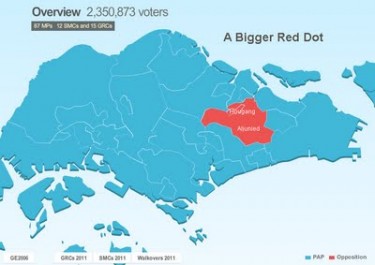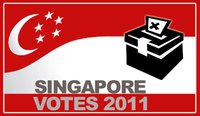The People's Action Party (PAP) dominated the recent General Elections in Singapore but opposition parties also scored some important victories as well. PAP has been in power since 1959.
Ng E-Jay interprets the results:
The results of the 2011 general election show that Singaporeans have grown more discontent with the ruling party, and that they are more prepared to vent their frustrations at the ballot box. However at the last moment, some voters appear to have held their cool, and retained support for the PAP.
Despite retaining majority seats in the parliament, the PAP’s reduced numbers in the polls were the lowest in several decades. Siew Kum Hong explains the decline of PAP:
…the PAP lost because it had lost touch with the ground. It had clearly under-estimated the extent of antipathy towards it by a large margin.
The themes of government accountability and arrogance played so strongly with the electorate, that the Prime Minister was compelled to apologise for the errors of his Government late in the campaign.
yawning bread credits the new media for the improved performance of the opposition Singapore Democratic Party:
I think the key move was actually its sustained investment in new media, allowing it to reach a new audience directly. Couple that with a party stand that combines substance with principled clarity, and it attracts a second look from citizens.
Words of the Cze identifies the Workers Party, which won a strategic Group Representation Constituency, as the leader of the opposition:
The Workers Party (WP) is now the opposition leader by a long shot, ensuring that its model of ‘constructive opposition’ and alternative policy suggestions will be dominant in the political paradigm for the foreseeable future. My perspective, for those unfamiliar, is very simple: the political space for the opposition is going to grow no matter what the PAP does, and it might as well be filled by the WP rather than just about any other party.
Politics thinks that PAP has “lost the ability to dictate the agenda”:
PAP has lost the ability to dictate the agenda. The PAP has originally campaigned on leadership renewal, 4G leadership etc, but it was obvious during the campaigning period, other issues such as cost of living, liberal immigrant policy, and housing took the stage

The Singapore opposition (red mark) gained five seats in the Parliament. Image from singaporesojourn.blogspot.com.
harishpillay believes that the voting results will inspire Singaporeans living in other countries:
We have to build on the momentum of these elections. I am sure that these results will perhaps spur many a Singaporean who gave up on their country and moved overseas to consider returning. To return and help build this into a nation that we can all be extremely proud of
Scrutinizing the Singapore government gives advice to political parties which intend to participate in the 2016 elections. Keanbon argues that PAP now has a “weak mandate“:
The spell is broken. Ruling with such a weak mandate necessitates a very serious endeavour in finding out and tackling the root causes – what members of the electorate are finally saying via the ballot box. Only then can new proposals be introduced and discussed on without a baggage. I hope this happens productively in the next 5 years.
Redbean reminds the opposition to field better candidates if they want to dominate the next elections:
For once, the PAP was humbled by the shift in sentiments against them. They sensed it during the election hustings. They knew that the people were angry. And they started to tone down their cocky and high and mighty approach even before Polling Day.
What is important is that the people have shown that they were most willing to change if there are good alternatives. If the opposition can attract more good candidates, the next GE is going to see a better contest.
According to Singapore Sojourn, the results showed that the people are “not happy with the status quo”:
So behind the numbers what does this all mean? The return of a stable government in a volatile economic environment is a real plus and the PAP's stewardship through the toughest of recessionary times should not be forgotten.
Despite this acceptance, the people of Singapore have signalled strongly to the government that they are not happy with the status quo; especially the growing wealth gap, the influx of foreign workers, rising prices and the cost of housing.
The results didn’t impress Political Writings:
The result is a very clear message from the electorate for the “opposition”: field good candidates, as good or better than the PAP candidates, and we’ll vote you. Conversely, field no-hopers and axe-grinders, we’ll dump you!
PAP got a very clear message from the electorate too: don’t threaten us, don’t talk down to us, don’t belittle us, don’t call us to repent.
Still, PAP has 81 seats against 6 for WP. And that’s hardly a good result!
funny little world has a message for PAP:
I hope the PAP will not forget that they represent all Singaporeans, not just the ones who voted for them. I hope you will not forget that too.
I hope the PAP will not forget that we are humans, not economic digits. I hope you will not forget that too.








7 comments